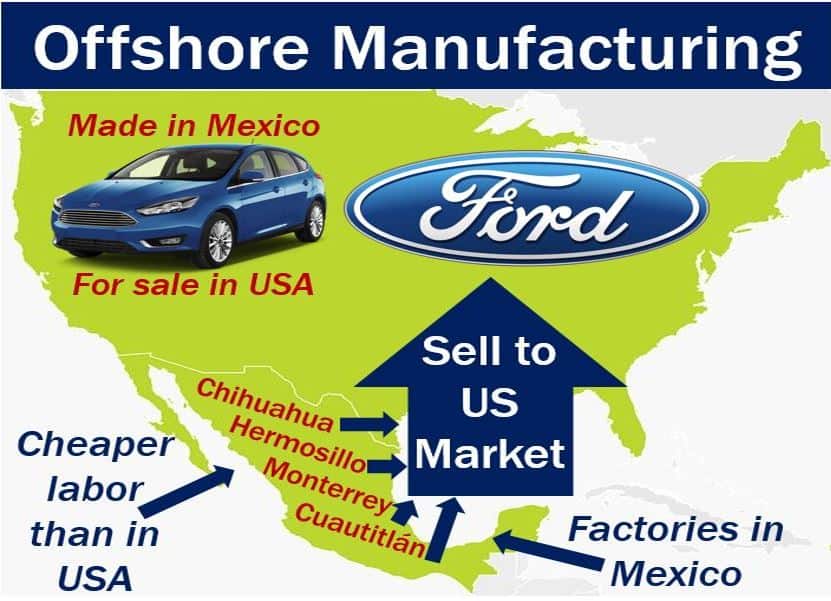Offshore Manufacturing refers to relocating the production or assembly of goods to another country. Companies usually do this because labor costs in the other country are low. Offshore manufacturing may also occur because raw materials in the other country are cheap.
The term offshore production has the same meaning as offshore manufacturing.
Offshore manufacturing is part of the umbrella term ‘offshoring.’ Offshoring refers to the relocation abroad of any business process. In most cases, the company relocates an operational process, such as product assembly or manufacturing. Businesses may also move supporting processes such as accounting abroad.
Offshore manufacturing can contribute to a company’s scalability by enabling rapid production expansion without the constraints of domestic facility limitations.
The relocation of production and other sections of a company abroad are part of a process we call globalization.
What is or isn’t offshore manufacturing?
Offshore manufacturing or production offshoring involves the relocation of the manufacturing process overseas. For example, a US car manufacturer may relocate the production or assembly of vehicles to Mexico.
We do not understand the term to mean opening a factory abroad for that local market. For example, it does not mean having a BMW factory in the USA if the aim is to sell to Americans. BMW is a German car manufacturer.
Offshore manufacturing specifically means relocating manufacturing abroad and then selling the goods in the company’s home country.
British pharmaceutical company AstraZeneca (AZ) has production facilities in Mexico and China. AZ did not open those factories to sell to British consumers. They produce goods for Mexican and Chinese consumers. Therefore, in most people’s opinion, AZ did not participate in offshore manufacturing in those countries.
However, US carmaker Ford has factories in Mexico. American consumers buy most of the cars that Ford produces in Mexico. Therefore, Ford was involved in offshore manufacturing when it opened production facilities in Mexico.

Offshoring and NAFTA
A major incentive for offshore manufacturing emerged when NAFTA made it easier for American manufacturers to relocate to Mexico. NAFTA stands for the North American Free Trade Agreement.
Labor costs in Mexico are a fraction of what they are in the United States. Therefore, by relocating south of the border, US companies can save a lot of money. Lower production costs helps a company become more competitive.
However, Chinese labor costs were even lower than Mexico’s twenty years ago. Consequently, the offshoring trend shifted to China. China had fewer workers’ rights than Mexico, as well as a currency that shadowed the dollar. It also had cheap land and loans, and few environmental regulations.
Additionally, China offered a potentially massive domestic market. In fact, today, China’s consumer market is the second-largest in the world, after the USA.
Offshore manufacturing can also be driven by strategic access to new markets, logistical advantages, or favorable trade policies in the host country.
Offshoring and intellectual property
However, many hi-tech companies are reluctant to produce their state-of-the-art products in China. They are reluctant because of China’s poor enforcement of intellectual property laws. In other words, there is a serious risk of copycat products.
Hi-tech companies view Mexico as a better bet than China for their intellectual property.
What is offshore?
In business, offshore means operating in a foreign country. If I have an offshore account, it means my account is abroad.
Offshore financial centers offer services to people from other countries. They are either tax havens or places with much lower tax rates than the home country of the account holder or financial institution.
Most offshore financial centers have small populations. In fact, many of them are or were British protectorates or colonies.
An offshore company may be a business that operates in one country but is registered in another. They are also firms that produce goods abroad, and then import them into another country. In other words, they import the goods to the country where they do most of their business.
The term ‘offshoring’ means to relocate some of a business’ activities abroad.
An offshore fund is a fund that operates in another country, usually a tax haven.
Video – What is Offshore Manufacturing?
